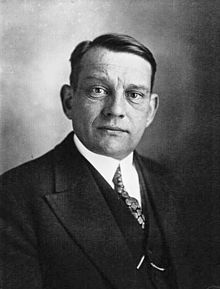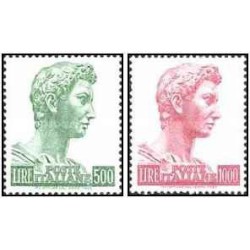- جدید
- ناموجود



توجه : درج کد پستی و شماره تلفن همراه و ثابت جهت ارسال مرسوله الزامیست .
توجه:حداقل ارزش بسته سفارش شده بدون هزینه پستی می بایست 100000 ریال باشد .
رنه ژول گوستاو کوتی (به فرانسوی: René Jules Gustave Coty) (۱۸۸۲ – ۱۹۶۲) هفدهمین رئیس جمهور فرانسه
René Jules Gustave Coty (French pronunciation: [ʁəne kɔti]; 20 March 1882 – 22 November 1962) was President of France from 1954 to 1959. He was the second and last president of the Fourth French Republic.
| René Coty | |
|---|---|
 |
|
| René Coty in 1929 | |
| 17th President of France | |
| In office 16 January 1954 – 8 January 1959 |
|
| Prime Minister | Joseph Laniel Pierre Mendes-France Edgar Faure Guy Mollet Maurice Bourgès-Maunoury Félix Gaillard Pierre Pflimlin Charles de Gaulle |
| Preceded by | Vincent Auriol |
| Succeeded by | Charles de Gaulle |
| Co-Prince of Andorra | |
| In office 16 January 1954 – 8 January 1959 Served with Ramon Iglesias i Navarri |
|
| Preceded by | Vincent Auriol |
| Succeeded by | Charles de Gaulle |
| Personal details | |
| Born | René Jules Gustave Coty 20 March 1882 Le Havre, France |
| Died | 22 November 1962 (aged 80) Le Havre, France |
| Political party | CNIP |
| Spouse(s) | Germaine (née Corblet) Coty |
| Occupation | Lawyer |
| Religion | Roman Catholic |
René Coty was born in Le Havre and studied at the University of Caen, where he graduated in 1902, receiving degrees in law and philosophy. He worked as a lawyer in his hometown of Le Havre, specialising in maritime and commercial law.
He also became involved in politics, as a member of the Radical Party, and in 1907 was elected as a district councillor. The following year he was elected to the communal council of Le Havre as a member of the Republican Left group. He retained both of these positions until 1919. Coty also served as a member of the Conseil Général of Seine-Inférieure 1913–1942, holding the post of Vice President from 1932.
With the outbreak of the First World War, Coty volunteered for the army, joining the 129th Infantry Regiment. He fought at the Battle of Verdun. In 1923, Coty entered the Chamber of Deputies, succeeding Jules Siegfried as Deputy for Seine-Inférieure. However, by this stage of his political career he had moved away from the Radical Party, and sat as a member of the Republican Union. Between 13 and 23 December 1930 he served as Under-secretary of State for the Interior in the government of Théodore Steeg.
In 1936, Coty was elected to the Senate for Seine-Inférieure. He was one of the French parliamentarians who, on 10 July 1940, voted to give extraordinary powers to Philippe Pétain, thereby bringing about the Nazi-backed Vichy government. Coty remained relatively inactive during World War II, although he was rehabilitated after the war.
He was a member of the Constituent National Assembly from 1944 to 1946, and chaired the right-wing Independent Republican group, which later became part of the National Center of Independents and Peasants. Coty was elected to the National Assembly in 1946 as a Deputy for Seine-Inférieure, and from November 1947 to September 1948, he served as Minister for Reconstruction and Urban Planning in the governments of Robert Schuman and André Marie. Coty was elected as a member of the Council of the Republic in November 1948, and served as Vice President of the Council from 1952.
Coty stood as a candidate for President in 1953, although it was thought unlikely that he would be elected. Nonetheless, and despite twelve successive ballots, right-wing favourite Joseph Laniel failed to obtain the absolute majority required. Following the withdrawal of another key right-wing candidate, Louis Jacquinot, Coty was finally elected in the thirteenth ballot on 23 December 1953, winning 477 votes against the 329 of the socialist Marcel-Edmond Naegelen. He succeeded Vincent Auriol as President on 16 January 1954.
As President of the Republic, Coty was even less active than his predecessor in trying to influence policy. His presidency was troubled by the political instability of the Fourth Republic and the Algerian question. With the deepening of the crisis in 1958, on 29 May of that year, President Coty appealed to Charles de Gaulle, the "most illustrious of Frenchmen" to become the last Prime Minister of the Fourth Republic. Coty had threatened to resign if de Gaulle's appointment was not approved by the National Assembly.
De Gaulle drafted a new constitution, and on 28 September, a referendum took place in which 79.2% of those who voted supported the proposals, which led to the Fifth Republic. De Gaulle was elected as President of the new Republic by parliament in December, and succeeded Coty on 9 January 1959. Coty was a member of the Constitutional Council from 1959 until his death in 1962.
تشکر نظر شما نمی تواند ارسال شود
گزارش کردن نظر
گزارش ارسال شد
گزارش شما نمی تواند ارسال شود
بررسی خود را بنویسید
نظر ارسال شد
نظر شما نمی تواند ارسال شود

check_circle
check_circle
















